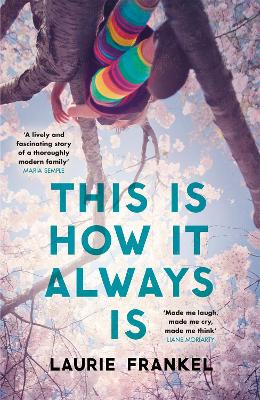
'A very special book about a family with a secret. It made me laugh, it made me cry, it made me think.' Liane Moriarty, No. 1 bestselling author of THE HUSBAND'S SECRET
Laurie Frankel's THIS IS HOW IT ALWAYS IS the 'fascinating story of a thoroughly modern family and the giant, multifaceted love that binds them... Sparkles with wit and wisdom' (Maria Semple). Perfect for readers of WE ARE ALL COMPLETELY BESIDE OURSELVES and THE UNLIKELY PILGRIMAGE OF HAROLD FRY.
This is how a family keeps a secret...and how that secret ends up keeping them.
This is how a family lives happily ever after...until happily ever after becomes complicated.
This is how children change...and then change the world.
This is Claude. He's five years old, the youngest of five brothers, and loves peanut butter sandwiches. He also loves wearing a dress, and dreams of being a princess.
When he grows up, Claude says, he wants to be a girl.
Rosie and Penn want Claude to be whoever Claude wants to be. They're just not sure they're ready to share that with the world. Soon the entire family is keeping Claude's secret. Until one day it explodes.
Laurie Frankel's THIS IS HOW IT ALWAYS IS is a novel about revelations, transformations, fairy tales, and family. And it's about the ways this is how it always is: Change is always hard and miraculous and hard again, parenting is always a leap into the unknown with crossed fingers and full hearts, children grow but not always according to plan. And families with secrets don't get to keep them forever.
'An intelligent, life-affirming, emotionally charged story' Prima
- ISBN10 1472241584
- ISBN13 9781472241580
- Publish Date 9 February 2017 (first published 24 January 2017)
- Publish Status Out of Print
- Out of Print 29 March 2021
- Publish Country GB
- Publisher Headline Publishing Group
- Imprint Headline Review
- Format Hardcover
- Pages 336
- Language English
Reviews


Bianca
“maybe she—and you and I—need to learn to live in a world that refuses to accept a person with a beard who goes by ‘she’ and wears a skirt and be happy anyway.”
“How?”
“How what?”
“How do we learn to live in that world and be happy anyway?”
About how a family, protecting their trans kid, is owned by their secret. It’s about acceptance, but also about the ways society tells us it’s wrong for a boy to wear dresses just like it’s wrong for a girl to be in sports. It’s maddening, frustrating, and sad.

Whitney @ First Impressions Reviews
However, midway through the book Claud shaves his head and with that the novel jumped the shark. Claud debates whether he should fully transition or continue to be what society considers normal. To clear his head he goes to Thailand and teaches English as a second language (keep in mind he is only ten). I just felt like the author didn't know where to go from there and the plot began to unravel.
Overall, I thought it was a good book and really enjoyed the narrator Gabra Zackman but, the novel never sprung back from its diverged road.
This review was originally posted on First Impressions Reviews

Leigha
If you’ve been reading my reviews for a while, you’ll notice this is not my typical reading fare – it’s my book club pick this month. Literary fiction tends to be too saccharine for my tastes, and this book is no exception. It takes an intimate look at gender dysphoria through the lens of one family. On one hand, the discussion about gender – what makes a boy a boy and a girl a girl – is interesting. So much of gender is constructed by society. Engaging with that commentary is bold and rarely done well. This book does a decent job showing various elements of the issue, including stepping back to broaden the lens beyond Western society. This book would be enjoyable for those of you looking for a close look at gender.
On the other hand, I found the characters to not feel very realistic. I had the hardest time connecting to the parents, Rosie and Pen. While I appreciated their thoughtful consideration of gender dysphoria, I found the rest of their characterization to be problematic. It felt like they ignored the rest of their four children. I get Claude/Poppy had special circumstances, but it’s not healthy to devote all your time and attention to just one kid. And how in the hell did a seven person family have the funds to move to Seattle? I don’t care that Rosie is a doctor. Seattle is expensive. Additionally, the audiobook narrator never fully hooked me. The narrator wasn’t bad, per se, just didn’t bring the characters to life.
tl;dr While an interesting look at gender identity, I found the characters to be unbelievable and the story to be too saccharine.

Jo
Trigger Warning: Homophobic and ableist language, and transphobic behaviour feature in this book.
I don't often contemporary adult novels, but this is one I just couldn't pass up, not when it's about a family, and how they work out how best to help and support their trans daughter and sister. This is such a beautiful and moving novel, I absolutely loved it.
When Rosie and Penn's three-year-old son wants to wear a dressing-up play dress, of course they allow it. Claude is just a child, after all, and there's no harm in playing - you don't need to force gender roles when into a child's playtime. But it soon becomes clear that this is more than just their son wanting to play - their son is actually their daughter. What do you do when you realise your young child is transgender? Poppy, as she chooses to be called, is just a child; she doesn't understand that we don't live in a perfect world, that there are those in society who have a problem with girls who have a penis, or boys who have a vagina. She also doesn't know about puberty, and the affects it will have on her body. Poppy is just a girl, and that's that. But Rosie and Penn do not what people can be like, they do know what puberty will do to her body. There are certain decisions that have to be made, decisions that Poppy is too young to make herself, or even fully understand. Her parents have to make them for her. They love their daughter, they fully accept her as she is, but they know the obstacles Poppy will face. You want to protect your children, but there are some things you can't protect your children from, so what do you do?
What I loved about this novel - that's told over a number of years, from when Poppy is born to when Poppy is ten - was how much love these parents have for their daughter. They're shocked and lost at first, but they do all they can to help their daughter be their daughter. They seek advice, they let her nursery know and discuss support for their daughter, they buy her new clothes - dresses and skirts and pretty tops - and allow her to grow out her hair. One day Claude went to nursery, and the next, Poppy. Although terrifying, as children can be cruel, it goes smoothly. But when problems do occur, Rosie and Penn have to make decisions, make choices, but they can't see into the future, they don't know the consequences of their decisions - for Poppy and the rest of their family - and nor do they always agree on the what is best for Poppy. I thought this was particularly powerful, because we get to see that there are several possibilities, but also that there is no definitive "right" way of raising a transgender child. Both think their way of doing things is the right thing for Poppy, both think each other's way of doing things will be detrimental for Poppy. Sometimes they agree. Sometimes they believe they don't have to make a decision right now, and sometimes not deciding has it's own consequences.
What is wonderful is that This Is How It Always Is is written by an author who is a parent of a transgender child. This book isn't a memoir, it's fiction, but there is a knowing to this story; Rosie and Penn's thoughts and worries, questions and opinions, the choices before them and the decisions they make, you read knowing that Frankel knows how Rosie and Penn feel, has faced these choices and made decisions, has thought about the future and the obstacles that lay ahead. This isn't a black and white story, there are no definite rights and definite wrongs when it comes to raising a transgender child you're trying to help, love and support. There's uncertainty and there's worry, and there's trying to do your best, but sometimes you make mistakes - but this is how it always is when you rise a child, trans or otherwise; parenting is full of questions and worries and decisions that have to be made, there's no manual for parenting, no matter what your child's gender identity.
I also loved how this wasn't just Rosie and Penn's story, nor that it was just Poppy's story; it was the family's story. Poppy's older brothers, Roo, Ben, Orion and Rigel are all affected by the choices their parents make in trying to do right by Poppy. And sometimes what's right for Poppy has negative impacts on her brothers. But they also love their sister; they completely accept her, but they worry for her, too. Sometimes they think their parents are making the wrong choices. They go to school, they know what school children can be like, and they're scared. Roo especially. He goes to his parents, he has a go at them, he pleads with them. But he is a child himself, and can't see the bigger picture. Even so, it was still so wonderful to this boy, and all the others, love and care for their sister, and want her to be safe, too. It was just gorgeous!
There were a few times where I frowned in concern when it came to the pronouns and the name used, but as I read on, it was Rosie and Penn getting used to the changes, and, later, trying to do what they thought Poppy wanted. When Claude is no more and Poppy is here instead, there's a while where her parents struggle to get used to the change in pronouns, and still sometimes refer to Poppy as he/him. It was like a habit they had to break, a change in the way they thought about their child. Later, when Poppy experiences something awful, and starts presenting as male again, Rosie goes back to calling her "Claude" and using male pronouns, believing that while she's struggling to work things out, this is what she wants. Again, I started getting worried; Poppy was still Poppy, she was still a girl, and that hadn't changed because she experienced something awful, and decided to present as male. But again, it became clear that this was down to the characters, not down to the author; Penn still called Poppy "Poppy", still used female pronouns. It's difficult, because I can completely see why Rosie thought what she did, why she chose to call Poppy "Claude", this was her again trying to do what was best for her child, doing what she thought would make her child happy while her child is struggling with how she feels. But at the same time, I disagreed with it. I think there were times when Rosie didn't fully grasp things, didn't fully understand what being transgender meant, and so sometimes she makes decisions and mistakes because of that. She knows what "transgender" means, but if Poppy is Claude again, then maybe Claude isn't transgender. When the case was Poppy was trying to be someone society would accept, because they weren't accepting her as herself, and I don't think Rosie fully understood that at the time. Which I think is probably pretty realistic.
There was another thing I had a big problem with. There is use of the word "spastic" twice, which I really wasn't happy with. However, it's used in the narration of a ten-year-old - a ten-year-old who is still learning. Although it's an offensive word, I think it's use is realistic for the person using it. Saying that, it should have been challenged. It would have been better if the word was said aloud rather than thought, then it could have been corrected. There is no correction, and it's not implied that this word is inappropriate or vile. And it's use is just so unnecessary; it's not necessary to use that word to describe an object that isn't behaving the way you would expect. And considering what Poppy goes through in the book, I just would have thought Frankel would be a little more sensitive to words that have been used as offensive slurs to other marginalised groups. I was just so disappointed and angry. This word is not ok, and it should have been picked up on somewhere in the editing process.
Otherwise, this is such a beautiful story. It's full of tough questions and it makes you think. Your heart goes out to everyone in this gorgeous, wonderful family who are trying to do their best by their lovely daughter and sister. Your heart will break more than once, but the love this family have for Poppy will mend it each and every time.
Thank you to Headline Review via NetGalley for the eProof.
